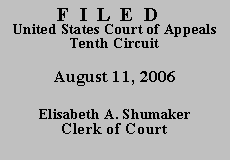

| GARY EUGENE TODD, |
|
The issuance of a COA is jurisdictional. Miller-El v. Cockrell, 537 U.S. 322, 336 (2003). Where, as here, the district court dismisses a petition on procedural grounds, a COA requires the inmate to demonstrate that it is reasonably debatable whether (1) the petition states a valid claim of the denial of a constitutional right, and (2) the district court's procedural ruling is correct. Slack v. McDaniel, 529 U.S. 473, 484 (2000). Viewed against the backdrop of the one-year statute of limitations set forth in 28 U.S.C. § 2244(d)(1), we conclude that the district court's determination that the petition was time-barred is not reasonably debatable.
On April 15, 2002, Mr. Todd was convicted, following a plea of guilty, of two counts of sexual abuse of a minor child. He was sentenced to thirty years imprisonment and a $500 fine on each count, and the sentences were to run concurrently. Mr. Todd did not file a direct appeal. Rather, on October 4, 2002, Mr. Todd filed a petition for judicial review under Okla. Stat. Ann. tit. 22, § 982a. This petition was denied by the state district court judge on October 15, 2002. Mr. Todd's motion for reconsideration was also denied.
Next, on May 23, 2003, Mr. Todd filed a motion to withdraw his plea out of time. The state district court, construing the motion as one for post-conviction relief, denied his request on July 9, 2003. Days later, on July 16, Mr. Todd filed yet another application for post-conviction relief, which was also denied. Mr. Todd then appealed the denial of both of his motions to the Oklahoma Court of Criminal Appeals ("OCCA"). The OCCA declined to exercise jurisdiction over the first appeal and dismissed it as untimely. On November 6, 2003, the OCCA dismissed Mr. Todd's second appeal based upon his failure to present a certified copy of the state district court's order denying post-conviction relief. Undeterred, Mr. Todd sought a federal arena for his claims and filed his § 2254 motion in the district court on December 17, 2003. As noted above, the district court dismissed the petition as untimely.
It is perfectly clear that while as a general rule, the limitations period begins to run from the date on which a prisoner's conviction becomes final, it can be tolled or suspended during the pendency of a state application for post-conviction relief properly filed during the limitations period. 28 U.S.C. § 2244(d)(2). Upon application of the statutory framework to this case, we conclude that Mr. Todd's habeas petition was filed after the expiration of the one-year limitations period.
Mr. Todd did not file a direct appeal, and thus his conviction became final ten days after pronouncement of his judgment and sentence, that is, on April 25, 2002. Mr. Todd argues that under Rogers v. State, 8 P.2d 1111 (Okla. Crim. App. 1932), he had six months to appeal and thus his conviction did not become final until then. Under the current statutes, however, Mr. Todd had ten days (not six months) in which to file. See Okla. Stat. tit. 22, ch. 18, app., Rules 2.1 and 2.5. As such, the one-year limitations clock began to run on April 25, 2002 and, absent some tolling event, a federal petition for habeas filed after April 25, 2003 would be untimely. United States v. Hurst, 322 F.3d 1256, 1261 (10th Cir. 2003). Mr. Todd's first appeal in this case, filed pursuant to Okla. Stat. Ann. tit. 22, § 982a, does not qualify as a post-conviction proceeding for tolling purposes under § 2244(d). See Nicholson v. Higgins, 147 Fed. App'x. 7, 8 n.2 (10th Cir. 2005) (unpublished). Furthermore, neither of Mr. Todd's applications for post-conviction relief in state court toll the limitations period because both were filed after the one-year period had expired. It is well settled that a collateral attack filed in state court after the limitations period has already expired does not serve to toll the statute of limitations. Fisher v. Gibson, 262 F.3d 1135, 1142-43 (10th Cir. 2001).
It is true that the limitations period is not jurisdictional and therefore "may be subject to equitable tolling." Miller v. Marr, 141 F.3d 976, 978 (10th Cir. 1998). In order to justify equitable tolling, Mr. Todd must make a specific showing of (1) lack of access to relevant materials, and (2) the steps taken to "diligently pursue his federal claims." Id. Mr. Todd's reference to the merits of his case including ineffective assistance of counsel does not constitute the "rare and exceptional circumstances" required for equitable tolling. There exists no statutory nor equitable basis for extending the limitations period, and accordingly, we DENY a COA and DISMISS the appeal.
Entered for the Court
Paul J. Kelly, Jr.
Circuit Judge